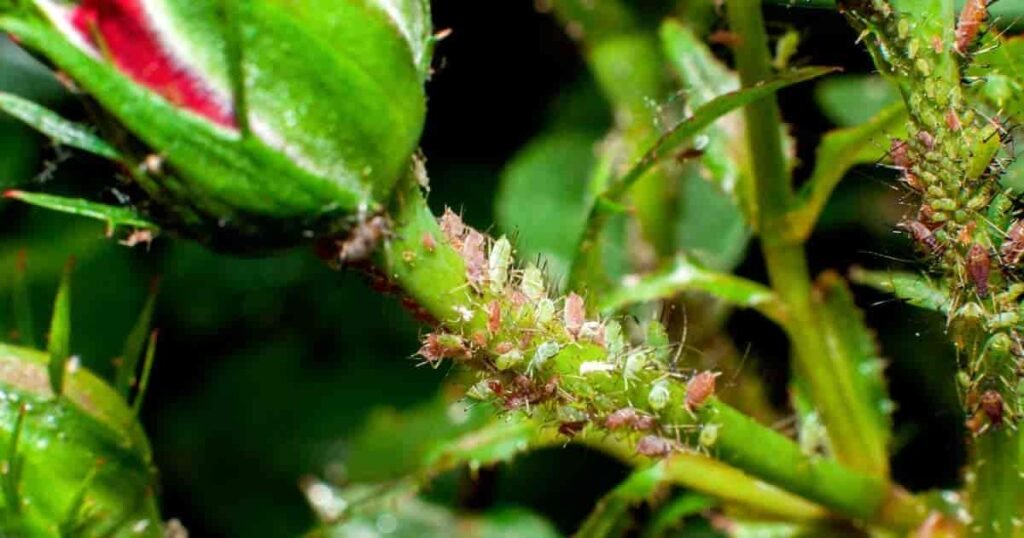Roses, with their delicate beauty and captivating fragrance, are a cherished addition to any garden. However, these beloved flowers are often targeted by tiny, destructive pests known as aphids. In this comprehensive guide, we will explore what aphids are, why Aphids on roses, effective methods for getting rid of them, preventive measures to avoid future infestations, and address common questions related to aphid control.
What Are Aphids?
Aphids are small, sap-sucking insects that belong to the order Hemiptera. They come in various colors, including green, yellow, black, and brown, and are commonly found on the undersides of leaves and along stems. Aphids reproduce rapidly, giving birth to live young without the need for mating, which allows their populations to multiply rapidly under favorable conditions.
Why Are Aphids Harmful for Roses?
While aphids may seem inconspicuous due to their size, they can cause significant damage to roses in several ways:
- Feeding Damage: Aphids pierce the tender tissues of rose plants and extract sap, depriving the plants of essential nutrients and weakening their growth.
- Honeydew Production: Aphids excrete a sticky substance called honeydew, which can coat leaves and stems, promoting the growth of sooty mold and attracting other pests such as ants.
- Transmission of Diseases: Aphids can transmit viral diseases to roses, further compromising their health and vitality.
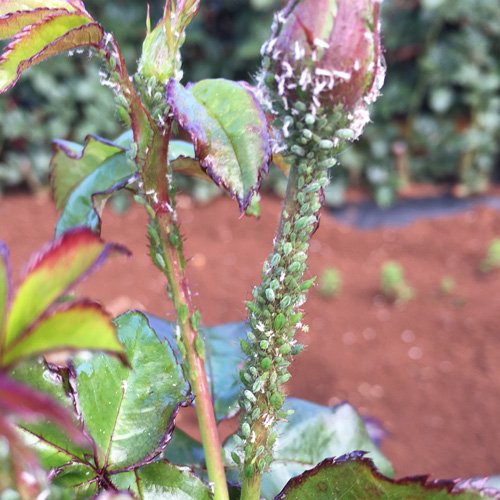
How to Get Rid of Aphids on Roses
Effective aphid control involves a multi-faceted approach that combines physical, cultural, and chemical methods. Here are some strategies for getting rid of aphids on roses:
1. Manual Removal:
- Spray with Water: Use a strong jet of water from a garden hose to dislodge aphids from rose plants. Focus on the undersides of leaves and along stems where aphids tend to congregate.
- Handpicking: Wear gloves and manually remove aphids from rose plants by gently rubbing them off with your fingers. Dispose of the aphids by dropping them into a bucket of soapy water.
2. Natural Predators:
- Encourage Beneficial Insects: Introduce or attract natural predators of aphids, such as ladybugs, lacewings, and parasitic wasps, to your garden. These insects feed on aphids and help keep their populations in check.
3. Neem Oil:
- Spray with Neem Oil: Neem oil, derived from the neem tree, is a natural insecticide that can repel aphids and disrupt their life cycle. Dilute neem oil according to the manufacturer’s instructions and spray it onto affected rose plants.

Pure Zuprime Neem Oil for Plants
Zuprime Neem Oil concentrate is your go-to neem oil spray for indoor ornamental plants as well as neem oil spray for outdoor ornamental plants. It’s made with 100% cold pressed high quality organic neem oil your plants need for a shiny glow.
4. Insecticidal Soap:
- Apply Insecticidal Soap: Insecticidal soap is a safe and effective option for controlling aphids on roses. Spray diluted insecticidal soap onto infested plants, ensuring thorough coverage of aphids and their hiding places.
5. Horticultural Oil:
- Use Horticultural Oil: Horticultural oil suffocates aphids by coating their bodies and blocking their airways. Apply horticultural oil to rose plants during the dormant season or when temperatures are below 90°F (32°C) to avoid leaf burn.
Prevention
Preventing aphid infestations is essential for maintaining the health and vigor of rose plants. Here are some preventive measures you can take:
- Monitor Plants: Regularly inspect rose plants for signs of aphid infestation, such as curled leaves, distorted growth, and the presence of honeydew.
- Prune Prudently: Prune rose plants to improve airflow and light penetration, reducing the likelihood of aphid infestations and fungal diseases.
- Promote Plant Health: Provide rose plants with optimal growing conditions, including adequate sunlight, well-draining soil, and proper irrigation, to strengthen their natural defenses against pests and diseases.
Frequently Asked Questions (FAQs)
Are aphids harmful to other plants besides roses?
Yes, aphids can infest a wide range of plants, including vegetables, fruits, ornamentals, and trees. They are particularly attracted to plants with succulent, tender growth.
Can I use chemical pesticides to control aphids on roses?
While chemical pesticides can be effective against aphids, they may also harm beneficial insects and disrupt the natural balance of the ecosystem. Consider using less toxic alternatives, such as insecticidal soap or neem oil, before resorting to chemical pesticides.
How do I know if aphids have become resistant to insecticides?
If aphids persist despite repeated applications of insecticides, they may have developed resistance to the chemicals. Rotate between different modes of action or use integrated pest management strategies to prevent resistance from developing.
Conclusion
Aphids on roses can be a nuisance, but with the right techniques and vigilance, you can effectively control their populations and protect your prized plants. By implementing the strategies outlined in this guide and staying proactive in your approach to pest management, you can enjoy healthy, vibrant roses in your garden for years to come.

